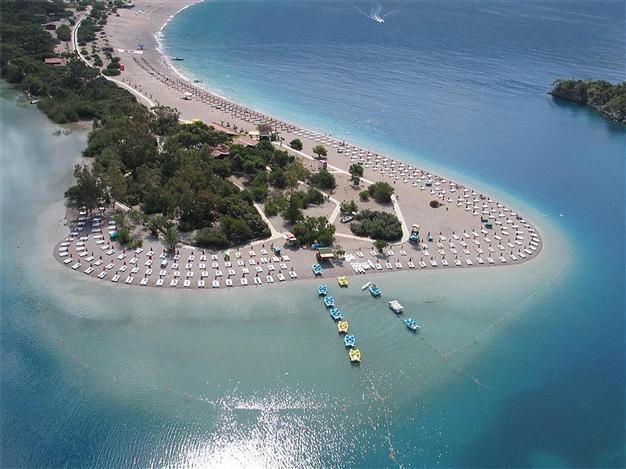Locals march against privatization of Fethiye’s postcard beaches
MUĞLA – Doğan News Agency

Locals of the Mediterranean resort town of Fethiye marched on June 29 to protest the privatization of two public beaches in Ölüdeniz, both commonly featured in postcards and tourism advertisements.
The sandy beaches of Kumburnu and Belceğiz have recently been sold by the administration of the province of Muğla to a private company, who will now be entitled to determine the rental prices of sunbeds and parasols to tourists.
The practice, which has become common in many summer towns along Turkey’s coasts, has infuriated nongovernmental organizations and tourism agencies in Fethiye who have demanded the beaches be given back to the locals.

“We have been struggling for years to take back the beaches from companies who seek to make a profit. There are many associations in Fethiye that can run the beaches, but they did not get any results after their talks with Fethiye’s district governorship and the Muğla Governor’s Office,” said Mümtaz Köken, who heads a cooperative of tourism professionals (Turizm Geliştirme Kooperatifi) in Ölüdeniz.
The sites were previously owned by a small-scale and non-profit public company called MELSA.
The company, which was previously run by the governorship administration, was transferred to the municipality after most provincial administrations were closed as part of a recent institutional reform.
Many locals claim the sale of the beaches came after MELSA was transferred to a municipality that was won by the main opposition Republican People’s Party (CHP) during the March 30 local elections.
The municipality of Fethiye also gave its support to the locals’ protests. Fethiye’s Mayor Behçet Saatçi assured that the municipality will take legal action to prevent the beaches from being run by private companies.
Turkey’s most beautiful coasts are experiencing a construction boom, even in areas that are protected for being archeological sites or national parks.
The Ministry of Environment and Urban Planning has recently made a controversial move by drafting a plan that could pave the way for the mass construction of villas in the protected areas of Datça’s peninsula.
 Locals of the Mediterranean resort town of Fethiye marched on June 29 to protest the privatization of two public beaches in Ölüdeniz, both commonly featured in postcards and tourism advertisements.
Locals of the Mediterranean resort town of Fethiye marched on June 29 to protest the privatization of two public beaches in Ölüdeniz, both commonly featured in postcards and tourism advertisements. “We have been struggling for years to take back the beaches from companies who seek to make a profit. There are many associations in Fethiye that can run the beaches, but they did not get any results after their talks with Fethiye’s district governorship and the Muğla Governor’s Office,” said Mümtaz Köken, who heads a cooperative of tourism professionals (Turizm Geliştirme Kooperatifi) in Ölüdeniz.
“We have been struggling for years to take back the beaches from companies who seek to make a profit. There are many associations in Fethiye that can run the beaches, but they did not get any results after their talks with Fethiye’s district governorship and the Muğla Governor’s Office,” said Mümtaz Köken, who heads a cooperative of tourism professionals (Turizm Geliştirme Kooperatifi) in Ölüdeniz.